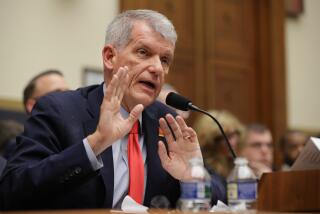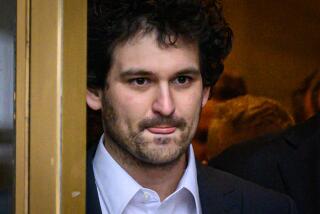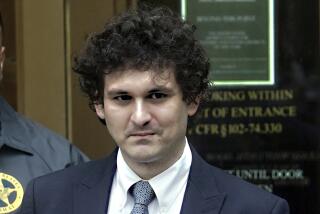Lay Says Articles Hurt Faith in Enron
- Share via
HOUSTON — Former Enron Corp. Chairman Kenneth L. Lay testified Tuesday that when the Wall Street Journal was preparing a crucial series of articles about his company in September 2001, he let subordinates talk him into stonewalling the newspaper even though it went “against every bone in my body.”
Lay largely blames the articles, the first of which appeared in mid-October 2001, for precipitating the crisis of confidence in the credit and stock markets that ultimately led to Enron’s bankruptcy filing that December. He earlier called the stories misleading and said they were prompted by short sellers who hoped to profit from a drop in Enron’s stock price.
The articles questioned Enron’s dealings with off-the-books partnerships created and run by former Chief Financial Officer Andrew S. Fastow. The government alleges that Enron used the partnerships, known as LJM for the first initials of Fastow’s wife and two children, to hide troubled assets and falsely pump up reported profit.
Lay, in his second day on the witness stand in his federal fraud and conspiracy trial, discussed the Journal stories during an exhaustive recounting of the events leading to Enron’s collapse.
Too exhaustive, in fact, for U.S. District Judge Sim Lake, who twice interrupted Lay’s defense lawyer, George McCall “Mac” Secrest, to question the relevance of his exhibits and to tell him to “move along.” Lake later said that the trial was a week behind schedule and that he might cut back the lunch break or otherwise extend what so far has been a six-hour workday. The trial, which began Jan. 30, now looks as though it may last another month.
Lay, 64, and former Enron Chief Executive Jeffrey K. Skilling, 52, are accused of lying to the public about the energy company’s financial health and conspiring with others to use accounting tricks to prettify its earnings reports.
In September 2001, a month after Lay had resumed the CEO post after Skilling’s surprise resignation, Enron’s public relations staff notified him that the Journal wanted an interview and had submitted a list of questions about the LJM partnerships.
“My policy has always been that it is better to talk to the press than not to,” Lay told the jury of eight women and four men.
But he said his subordinates considered the Journal’s questions to be “very biased and very judgmental,” as if the newspaper “had already made up its mind.” They advised Lay that if he refused to cooperate, “at worst it would be a one-day splash.”
Lay said he reluctantly agreed. Instead of an interview, Enron supplied the Journal with a brief statement saying that the Fastow deals were proper and had been approved by lawyers and accountants.
The first three Journal stories, published Oct. 17, 18 and 19, provided the first public revelations -- other than in footnotes to Enron financial statements -- of Enron’s extensive transactions with LJM, how the unwinding of some of its deals had led to a $1.2-billion equity reduction for Enron and how Fastow had earned millions of dollars from LJM while still serving as Enron CFO.
Over those three days, Enron’s stock plunged 19%.
Responding to Lay’s criticisms, Journal Managing Editor Paul E. Steiger said in a statement Tuesday: “Reporters at the Journal were leaders in uncovering the accounting irregularities at Enron -- in particular, the use of special-purpose partnerships to keep large financial liabilities off its financial statements, and the role of Enron CFO Andrew Fastow in these schemes. We are proud of our work.”
Fastow was later discovered to be looting the company of millions of dollars. He pleaded guilty to two counts of conspiracy and became the star prosecution witness against Lay and Skilling.
It wasn’t until the Journal and other media began spotlighting Fastow that Enron’s board of directors sought answers about his LJM profit. The board supported Fastow until Oct. 24, when, in Lay’s words, “they learned he’s raked off from these partnerships $45 million -- grossly more than any of us expected.”
The board voted to suspend Fastow. When Lay went to Fastow’s office after the board meeting to tell him of its decision, he said Fastow tried to negotiate a $5-million severance.
“At that point I told him, ‘Hell, no, Andy! Pack up your stuff and leave the building,’ ” Lay said.
More to Read
Inside the business of entertainment
The Wide Shot brings you news, analysis and insights on everything from streaming wars to production — and what it all means for the future.
You may occasionally receive promotional content from the Los Angeles Times.










